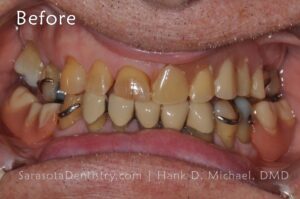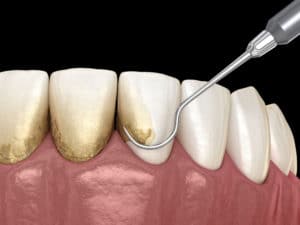Most families and intimate partners do not think much about exchanging kisses, sharing bites of food, or drinking from the same glass. But what are the risks if someone has oral bacteria that could cause inflammation? It is a concern if those bacteria lead to gum disease and, in a more serious case, periodontal disease.
Is periodontitis contagious? There is research suggesting that it can spread from person to person through saliva. With over 47% of adults having some form of periodontal disease, it is important to understand periodontitis and the conditions that increase its likelihood of spreading.
What Is Periodontitis?
Gum diseases
With early gum disease, the gums can be tender, swollen, and red. These reactions are the result of the body’s immune system attacking the bacteria to protect against an infection. If you identify gingivitis early enough, you may be able to prevent some or all of the damage.
Gingivitis that goes untreated typically evolves into periodontal disease, which not only infects the gums but also starts to break down the connective tissues and bone. This is all the result of the body trying to protect itself against a foreign body stuck in the gums like a splinter in your skin. Unfortunately, that tarter, also known as calculus, which is cemented to the tooth now makes the tooth the target. If the calculus isn’t removed from the tooth, it may result in bone loss, tooth mobility and eventual loss of the tooth/teeth. Periodontal infections are also common with more advanced forms of severe periodontitis. The immune system plays a huge roll in the progression of gum disease. Factors that affect the immune system include: stress (both physical and emotional), diet, health, age, weight, and medications.
You may have periodontal disease if you experience any of these symptoms:
- Bleeding when brushing or flossing, or red on your toothbrush bristles
- Changes in how your teeth fit together when you bite down
- Dark red or purple gums
- Gums that bleed easily or are tender or swollen
- Pain when chewing
- Persistent bad breath
- Pus between gums and teeth
- Receding gums
- Spaces that look like black triangles between teeth
- Teeth that are loose or falling out
While gum disease is not curable, treatments are available, depending on its severity. If you experience any of the symptoms of periodontal disease, see your dentist as soon as possible.
Is Periodontal Disease Contagious?
You may wonder “Can gum disease spread to another person?” While you are probably safe with brief, casual contact, long-term behaviors like kissing could increase another person’s risk for periodontal disease. You should also be wary of family settings where people share food and utensils or cough and sneeze near each other. Family members may also share some of the same habits such as diet and oral hygiene which can be significant factors contributing to the gum disease progression.
Researchers are still studying the extent to which periodontitis is contagious. Children whose parents have advanced gum disease are at greater risk for developing it, as are spouses and romantic partners. However, being in close contact that involves the exchange of saliva or bacteria does not automatically mean that you will develop periodontal disease.
Preventing the Spread of Bacteria Causing Gum Disease
Anyone can adopt behaviors that help prevent or control periodontal disease. The most effective prevention method is brushing and flossing daily to eliminate the bacteria that lead to gum disease. You should also schedule a dental check-up once or twice a year for a professional cleaning and to diagnose any early signs of gingivitis or other issues.
If you do develop gum disease, its progression depends to a large extent on your oral hygiene habits. Keeping the bacteria at bay or treating gum disease early may reduce the risk of spreading gingivitis or periodontal disease through saliva exchange.
Reducing the risk of infection among other family members or romantic partners requires good oral hygiene and treatment in more severe cases. If you need treatment, it is best to avoid kissing or other close contact until after recovery from your dental procedure.
Treating Periodontitis
If you have any symptoms of periodontal disease, seeing a dentist right away is crucial. After a thorough exam, they can recommend the best treatment for you.

If you have mild gum disease, you might be a good candidate for scaling and root planing. This procedure is like professional cleaning, but it extends to below the gums to remove plaque, tarter and/or calculus unreachable by a toothbrush or floss.
During scaling and root planing, the dental hygienist cleans or scales the tarter and then smooths (planes) the root surfaces to prevent new bacteria from accumulating. You may need a second appointment for the treatment to be effective, and you will likely receive local anesthesia. Once the tarter is removed and root is smoothed, it is critical to keep those surfaces clean with daily oral hygiene and regularly scheduled professional cleanings. This is a case where prevention is the best medicine.
Your dentist may recommend flap surgery if your gum disease is more advanced. During flap surgery, the dentist lifts back the gums to remove the tartar and plaque. After cleaning, the dentist sews the gums back together so that they close around the tooth.
Bone or gum grafting may be the best approach if you have bone or tissue damage. Grafting usually involves taking healthy bone or tissue from another part of the mouth and placing it where it can regenerate and replace the damaged parts.
To maintain the benefits of periodontal treatment, you must continue your oral hygiene to keep your gum disease under control. Although there is no cure for periodontitis, a reduction in the condition is possible with continued dental care and healthy dental habits at home. Even after successful treatment, you need life-long care to prevent the recurrence of infection and reduce the risk of spreading it to others.
- Dental Implant Pros and Cons - August 26, 2023
- Receding Gums Stages - August 12, 2023
- When Is It Too Late for Gum Grafting? - July 8, 2023


